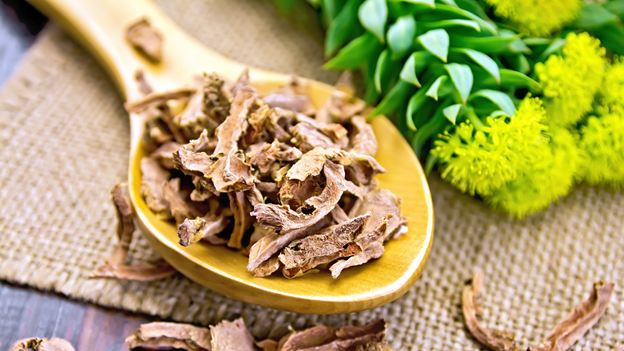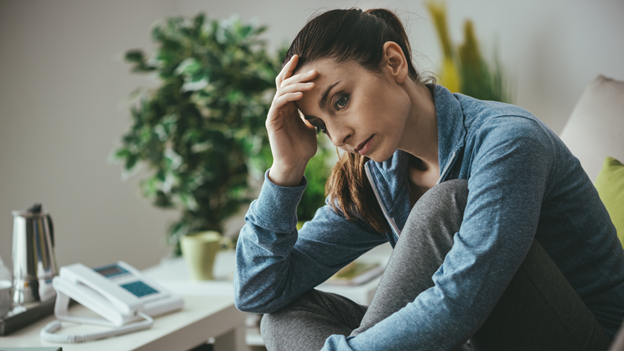Depression is a common and serious mental disorder that affects a lot of people around the globe. According to WHO, the mental health issue causes detrimental effects on the minds of more than264 million people globally.
Treating depression is a tricky business because the disease is often misdiagnosed as a mere mood fluctuation. However, the disorder is way more than a temporary mood swing.
And even after the malady is diagnosed, treatment with antidepressant medications is a dual-ended sword that does more harm than benefit. This is why a lot of people resort to natural remedies to cure moderate depression.
Signs And Symptoms Of Depression
Patients suffering from depression share more or less the same symptoms which are given below:
- A low mood (depressed mood)
- Fatigue
- Lack of energy
- Lack of pleasure in activities that gave pleasure previously
- Loss of sexual desire
- Unintentional weight loss (or gain in some cases)
- Abruptions in appetite
- Difficulty concentrating
- Recurrent thoughts of self-harm and suicide (suicidal ideation)
- Excessive sleeping
What Causes Depression?
Clinical depression is a complex mental health issue that has no specific cause. However, scientists have identified certain risk factors that increase your chances of falling into the abyss of depression. The risk factors include:
- Physical/sexual abuse
- Substance misuse (alcohol abuse,dual diagnosis)
- Prolonged conflicts (with friends/family)
- Death or loss of a loved one
- Medications (isotretinoin is a drug used to treat acne)
Natural Ways To Fight Moderate Depression
There are a number of natural remedies that have remarkable effects in the management of moderate depression. A change of lifestyle with help from herbal supplementation can flush out depression from your mind and body.
The best natural herbs for fighting moderate depression are mentioned below:
1. Ginseng

This herb from traditional Chinese medicine has provided numerous benefits to mankind for ages. The most evident therapeutic benefits of ginseng include sexual health improvement, a boost in immune health, strong antioxidant properties, and potent anti-cancer effects.
In addition to these useful properties, ginseng plays an effective role in helping you combat depression and anxiety. Ginseng achieves this feat in a number of ways:
Anti-Oxidant Effect
Increasedoxidative stress in the body is directly linked to increased chances of the development of depression. As per ameta-analysis, lower levels of antioxidants and higher levels of free radicals were found in depression patients.
Anothersystematic review and meta-analysis support this claim that higher oxidative stress is linked to depression.
The use of ginseng enables you to fight depression by effectively beating the free oxidative radicals in a duel. It was found in ananalysis that ginseng contains flavonoids and phenols that have potent radical scavenging properties.
Anotherstudy states that polysaccharides extracted from different parts of ginseng have differing but very strong antioxidant properties.
Antidepressant Effect
A2017 study revealed that ginseng helps regulate immune and hormonal responses that take place due to stress and depression. The mechanism of action of ginseng is unknown but it sufficiently reduces anxiety and depression.
Depression associated with substance withdrawal (alcohol) can effectively be managed with ginseng, astudy suggests. Anotherstudy shows that red ginseng is potent in reducing symptoms of depression in mice.
All these studies confirm that ginseng is effective in the management ofmoderate depression and anxiety, directly and indirectly.
2. Saffron
The expensive herb is a part of the Indian household. It carries plenty of health benefits. Depression patients can take advantage of the anxiolytic and antidepressant properties of saffron. It has been used in dishes for a long time. According to ameta-analysis, saffron can play a vital role in alleviating symptoms of mild to moderate depression.
Research shows that extracts of the flower of Crocus sativus (saffron) are safe and effective in subsiding effects of moderate depression. In addition to moderate depression the herb can be potent in the management of other major depressive disorders, ameta-analysis suggests.
Anotherstudy promotes the use of the herb saffron in the alternative management of depression and anxiety. Researchers recommend that herbal supplementation can be used as an additional therapy to psychotherapy and electroconvulsive therapy in the alleviation of depressive symptoms.
When compared with antidepressant medications, saffron seemed to show promising results. Postpartum depression is a reality that makes lives difficult for new mothers. This very herb is also effective in subsiding postpartum depression too. Fluoxetine is a drug frequently recommended for the management of postpartum depression. As per arandomized controlled trial, saffron is almost as potent as fluoxetine in improving depressive postpartum symptoms. It is also safe to use.
The efficacy of the antidepressant effect of saffron is praised and confirmed by a2018 study.
3. Rhodiola Rosea

Herbal supplements are effective in flushing out anxiety and depression from your body. A lot of herbs efficiently remove fatigue from the body, rejuvenate the battery of your body and enhance mood.
According to astudy, extracts of Rhodiola Rosea are potent in combating mild to moderate depression when given in 340 or 680mg doses per day for 6 weeks.
When tested against antidepressant medicines, the herb shows similar effects and superior safety. Astudy concluded that though the antidepressant effect of Rhodiola Rosea is not as much as sertraline the herb is better tolerated and has fewer adverse effects comparatively.
R. Rosea is identified as anadaptogen. Adaptogens are molecules that alter the endocrine and immune function of the body. According to astudy, Rhodiola affects various components of the neuroendocrine system, the effect of which is a reduction in stress and depression.
Chronic stress can lead to neuronal damage that eventually results in depression. This multi-benefit herb is advantageous in inducing neuronal growth and repairing the injured neurons in the brain, astudy suggests. You can also expect improvements ingeneralized anxiety disorders with the supplementation of Rhodiola Rosea.
According to arandomized controlled trial, R.rosea can prove to be an alternative therapy in the management of the major depressive disorder. This type of antidepressant therapy is safe and efficacious too. Thus, if you suffer from moderate depression, we recommend you add some Rhodiola to your diet.
4. Lavender
Lavender’s health benefits are heterogeneous. Be it oil extracted from this herb or a warm cup of tea. Lavender will increase your power to combat moderate depression. In astudy about herbal teas, it was found out that lavender tea diminishes anxiety and depression symptoms.
Referring to a2020 randomized trial, old people with anxiety and depression reported having alleviations in symptoms after consuming lavender tea. The participants also rejoiced at the fact that this supplement is inexpensive and easily accessible.
Women undergoing menopause are often faced with depression. In menopausal depression, there is reduced self-confidence and issues with appetite. Suicidal ideation may also be a feature of depression. It wasrevealed that bitter orange and lavender tea have a positive impact on depression patients and therefore, these teas can be used as complementary medicine.
A2021 meta-analysis promotes the use of lavender as an alternative treatment modality in the management of moderate depression. This meta-analysis of 342 studies showed that oral administration of lavender leads to improvement in depression patients.
Patients on corticosterone therapy sometimes face side effects such as depression. In anexperimental study, lavender oil was found to improve depression-like behavior and also enhanced mental health by promoting neurogenesis.
5. St. John’s Wort

The yellow flower, also known asHypericum is widely known for its health benefits. The very herb works tremendously in aiding you in the fight against moderate depression. There are numerous researches that promote the use of St. John's wort in the treatment of major depressive disorders.
According to a2018 meta-analysis of 37 randomized controlled trials, Hypericum perforatum has proven anti-depressant effects. Therefore, the herbal supplement can be efficaciously used as an alternative treatment for depression.
Anothersystematic review and meta-analysis revealed that Hypericum perforatum can justly be indicated for the management of depressive disorders. The results of this miraculous herb are comparable to antidepressant medicines.
As per aminireview, St. John’s wort extracts have shown to be successful against mild to moderate depression. The effect of this very flower has been appreciated both in the UK and the US. not just moderate but major depression can also be cured using supplements of St. John’s wort.
St.John’s wort showssimilar results to SSRIs (antidepressants) in efficacy when given for moderate depression. The herbal supplement is readily accepted by patients and there are no evident side effects. Patients suffering from depression due to chronic pain can take full advantage ofhypericum’s analgesic and anti-depressant properties.
6. 5-HTP
5-hydroxytryptophan is a part of the protein L-tryptophan. Supplementation of 5-HTP is suggested for improvements in mental health and cognition. This supplement may be recommended for anxiety and mood disorders (including moderate depression).
According to ablind study, 5-HTP and imipramine are equally efficacious in alleviating depression and associated symptoms.
A number of depression patients tend to binge eat at the peak of depressive episodes. Onestudy suggests that 5-HTP supplementation can improve symptoms associated with depression such as insomnia and binge eating.
Fibromyalgia patients can also be benefited from potent antidepressant effects of 5-HTP, astudy suggests.
7. Ashwagandha

Withania somnifera or more commonly known as ashwagandha is famous for anxiety and depression disorders. The findings of astudy suggest that ashwagandha is efficacious in the treatment of depression/anxiety in patients with schizophrenia.
Ashwagandha is one of those herbs that not only fight depression but also improve your strength against this dooming hell. The herb is identified as an adaptogen. As per ameta-analysis, ashwagandha can lessen the triggers of depression i.e. anxiety and stress.
By improving theneuroplasticity of the brain, ashwagandha aids in fighting depression. This is why researchers have resorted to the use of ashwagandha as a neuroprotective agent.Studies suggest its use in brain disorders.
The anxiolytic and antidepressant effects of ashwagandha are appreciated by astudycarried out in 2012. The fat extracts from ashwagandha possess strong antidepressant and adaptogenic properties. Therefore, it can be used as a potential adjuvant in the treatment of depressive disorders.
8. Valerian
Valerian root is famous for imparting calmness and serenity. The anxiety-reducing effect of valerian also promotes sleep. The herb is packed with antioxidants that improve cognition and brain function.
This herb lowers the levels ofneurotransmitter GABA in the body that is associated with chronic stress. The ultimate effect of this reduction is the induction of tranquility and serenity.
According to asystematic review, the use of herbal supplements such as passionflower, lavender, chamomile, saffron is very effective in fighting anxiety and depression.
When analyzing the effect of passionflower inanimal models, it was found that the herb is very effective at the job. In anotheraccount, it was established that valerian and St. John’s wort can be efficiently used in combination to cure depressive disorders.
The extracts of Valerian Officinalis prevent depression and depression-like behavior in rats, astudy suggests. Therefore, adding valerian to the diet to calm your nerves is a good idea. It can build up your mind to fight against depression.
Where Can I Find The Best Herbal Supplements For Moderate Depression?
To fight moderate depression all you have to do is log onto Beherbal.com and select from a variety of organic anti-depressant products. TheOrganic Ashwagandha Root powder extractwill flush out depression from your body.
TheGolden Saffron extract is potent in improving your brain function and reducing stress/anxiety. Depression patients struggling from sleep issues must try it out for better sleep and stress-free life.
On the other hand, theChill Pill is replete with numerous useful antidepressant supplements including ashwagandha, St. John’s wort, chamomile, valerian, and 5-HTP. This very combination can kick out depression from your body.
Conclusion
Moderate depression can be treated with herbal supplements in addition to medicinal options. Organic extracts of ashwagandha, St. John’s wort, and ginseng have been extremely potent against anxiety/depression.
Saffron, valerian, and 5-HTP supplements are also very effective in the treatment of moderate depression.


